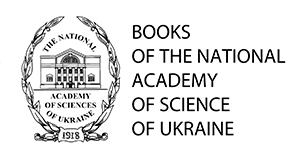Authors:
Anatoliy Yermolenko, (Editor), Doctor of Sciences in Philosophy, Professor, Corresponding Member of the NAS of Ukraine, Director of the H.S. Skovoroda Institute of Philosophy, NAS of Ukraine, Kyiv, Ukraine.
Yurii Bauman, Ph.D., Senior Researcher, H.S. Skovoroda Institute of Philosophy of National Academy of Sciences of Ukraine, Social Philosophy Department, Kyiv, Ukraine.
Denys Kiryukhin, Ph.D., Researcher, H.Skovoroda Institute of Philosophy of National Academy of Sciences of Ukraine, Social Philosophy Department, Kyiv, Ukraine.
Olena Lazorenko, Ph.D., Senior Researcher, H.Skovoroda Institute of Philosophy of National Academy of Sciences of Ukraine, Social Philosophy Department, Kyiv, Ukraine.
Mykola Nadolny, Senior Researcher, H.Skovoroda Institute of Philosophy of National Academy of Sciences of Ukraine, Social Philosophy Department, Kyiv, Ukraine.
Vitaliy Nechiporenko, Ph.D., Senior Researcher, H.Skovoroda Institute of Philosophy of National Academy of Sciences of Ukraine, Social Philosophy Department, Kyiv, Ukraine.
Viktoriia Shamrai
Ph.D., Senior Researcher, H.Skovoroda Institute of Philosophy of National Academy of Sciences of Ukraine, Social Philosophy Department, Kyiv, Ukraine.
Svitlana Shcherbak, Ph.D., Researcher, H.Skovoroda Institute of Philosophy of National Academy of Sciences of Ukraine, Social Philosophy Department, Kyiv, Ukraine Käte Hamburger International Center for Advanced Study ‘Cultures of Research’, RWTH Aachen University, Aachen, Germany.
Reviewers:
Mariia Kultaieva
Doctor of Science in Philosophy, Professor, Head of Department Philosophy at the H. S. Skoworoda National pedagogical university. Kharkiv, Ukraine.
Vadim Menzhulin
Doctor of Sciences in Philosophy, Professor, Head of Department Philosophy and Religious, National University of Kyiv Mohyla Academy: Kyiv, Ukraine.
Mikhailo Boichenko
Doctor of Sciences in Philosophy, Professor at the Department of Theoretic and Practical Philosophy, Taras Shevchenko National University of Kyiv. Kyiv, Ukraine.
Affiliation:
Project: Scientific book
Year: 2023
Publisher: PH "Naukova Dumka"
Pages: 352
DOI:
https://doi.org/10.15407/978-966-00-1898-3
ISBN: 978-966-00-1898-3
Language: Ukrainian
How to Cite:
Yermolenko, A., Bauman, Y., Kiryukhin, D., Lazorenko, O., Nadolny, M., Nechiporenko, V., Shamrai, V., Shcherbak, S. (2023) Discursive practices of deliberative democracy in Ukrainian society. Kyiv, Naukova Dumka. 352p. [in Ukrainian].
Abstract:
The author’s group aimed to carry out a socio-philosophical analysis of the processes of the formation of institutions of deliberative democracy in Ukraine, in particular, to reveal the complex and contradictory nature of the processes of distortion of communications in Ukrainian society, which take the form of simulative and imitative practices, when instead of argumentative discourses, quasi-communications aimed at to achieve not the argumentative consensus of citizens, but the goals and ensuring the interests of individual social groups. The research will show paradigmatic changes in modern social philosophy, accordingly, the concepts of deliberative democracy, communicative philosophy, and discursive ethics will be used, taking into account their methodological limits.
The authors of the monograph sought to find out, first of all, the following questions: what are the peculiarities of the deliberative democracy of Ukrainian society from the perspective of European integration? What is the ratio of deliberative and representative types of democracy given the development of existing institutions of civil society in Ukraine; what is the identification of the contradictory character and intellectual potential of discursive practices in the process of formation of institutions of deliberative democracy in Ukrainian society and what contradictions await Ukrainian society on this path.
In the search for answers to these questions and as a result of the research, the concept of the institutional formation of deliberative democracy in Ukrainian society was substantiated in the light of discussions about the current state of democracy in the world. The recommendations were formulated for the future development of discursive practices through the creation of institutions of deliberative democracy. The scientific novelty of the study is that it analyzes for the first time the intellectual and critical potential of discourse as a factor in the formation of deliberative democracy in Ukraine. The methodological basis of the research is transcendental-pragmatic, comparatives, phenomenological, system-functional, and analytical methods.
Keywords:
deliberative democracy, deliberation, dialogue, discourse, civil society, constitution, democracy, democratic governance, well-ordered society, liberalism
References:
Apel, K.-O. (1973). Transformation der Philosophie. Frankfurt am Main: Suhrkamp.
Apel, K.-O. (1988). Diskurs und Verantwortung. Das Problem des Übergangs zur postkonventionellen Moral. Frankfurt am Main: Suhrkamp.
Apel, K.-O. (1998). Praktische Philosophie als Diskurs und Verantwortungsethik (Zweiter Vortrag) In: Apel K.‑O., Hösle V., Simon-Schaefer R. Globalisierung. Herausforderung für die Philosophie. Bamberg: Universitäts-Verlag.
Benhabib, S. (1996). Toward a Deliberative Model of Democratic Legitimacy» in Seyla Benhabib (ed.). Democracy and Difference. Princeton. pp. 67-94.
Bessette, J. (1980). Deliberative Democracy: The Majority Principle in Republican Government. How democratic is the constitution? Washington, D. C.: American Enterprise Institute for Public Policy Research. P. 102—116. Access mode: https://www.econbiz.de/Record/deliberative-democracy-the-majority-principle-in-republican-government-bessette-joseph/10001898473 (access date:5.04.2019)
Bessette, J. (1994). The Mild Voice of Reason: Deliberative Democracy & American National Government. Chicago: University of Chicago Press.
Besson, S. (2005). The Morality of Conflict. Reasonable Disagreement and the Law. Oxford, Portland: Hart Publishing.
Böhler D. (1984). Diskurs und Verstehen. In: K.-O. Apel, D. B hler (Hrsg.), Funkkolleg Praktische Philosophie / Ethik. Studientexte III (S.985–996). Frankfurt a.M.: Fischer.
Böhler D. (1985). Rekonstruktive Pragmatik. Von der Bewußtseinsphilosophie zur Kommunikationreflexion: Neubegründung der praktischen Wissenschaften und Philosophie. Frankfurt am Main: Suhrkamp.
Böhler D. (2013). Verbindlichkeit aus dem Diskurs. Denken und Handeln nach der sprachpragmatischen Wende. München: Verlag Karl Alber.
Böhler D. (2014). Verbindlichkeit aus dem Diskurs. Denken und Handeln nach der Wende zur kommunikativen Ethik — Orientierung in der ökologischen Dauerkrise. München: Verlag Karl Alber.
Böhler, D. (2014). Responsibility for the future from a global perspective. The relevance of Hans Jonas’s philosophy and ethics of discourse. Tr. by A. Yermolenko. [In Ukrainian]. Кyiv: Stylos.
Burckhart H., Gronke H. (, 2002). Die Berliner Diskurspragmatik in der Diskussion In: Philosophieren aus dem Diskurs. Beiträge zur Diskurspragmatik / hrsg. H. Burckhart, H. Gronke. Würzburg: Königshausen & Neumann.
Burke, В. (1774). Speech to the Electors of Bristol 3 Nov. 1774. In: The Works of the Right Honourable Edmund Burke, by Edmund Burke. Volume 02. URL: http://www.gutenberg.org/ebooks/15198
Dryzek, J. (2006). Deliberative global politics. Discourse and Democracy in a Divided World. Cambridge: Polity Press.
Dryzek, J. (2000). Deliberative democracy and beyond: liberals, critics, contestations. Oxford, New York: Oxford University Press.
Ferrajoli, L. (2005). The crisis of democracy in the era of globalization. In: Law and justice in a global society. Granada, Espana. pp. 53–59.
Fishkin, J. S. (2003). Debating Deliberative Democracy. Oxford: Wiley-Blackwell.
Fishkin, J. S. (2009). When the People speak. Oxford: Oxford University Press.
Fishkin, J. S., & Luskin, R. C. (2005). Experimenting with a democratic ideal: Deliberative polling and public opinion. Acta Politica, 40(3). pp.284–298.
Grant T., (2015). Aggression against Ukraine: Territory, Responsibility, and International Law. NY: St. Martin’s Press LLC.
Gutmann, A., Thompson, D. (2004). Why Deliberative Democracy? Princeton: Princeton University Press.
Habermas, J. (1988). Nachmetaphysisches Denken. Philosophische Aufsätze. Frankfurt am Main: Suhrkamp.
Habermas, J. (1994). Faktizität und Geltung. Beiträge zur Diskurstheorie des Rechts und des demokratischen Rechtsstaats. Frankfurt am Main: Zuhrkamp.
Habermas, J. (1996). Between Facts and Norms. Contributions to Discourse Theory of Law and Democracy. Cambridge, Massachusetts: The MIT Press, P. 304—306.
Habermas, J. (1981). Theorie des kommunikativen Handelns. 2 Bde. Frankfurt am Main: Suhrkamp.
Habermas, J. (1973). Legitimationsprobleme im Spätkapitalismus. Frankfurt am Main: Suhrkamp.
Habermas, J. (1984). Vorstudien und Ergänzungen zur Theorie des Kommunikativen Handelns. Frankfurt am Main: Suhrkamp.
Held D. (2008). Models of Democracy. Stanford: Stanford University Press; 3rd edition.
Kornievskyi, O., & Nechyporenko, V. (2018). Deliberative component of stable sustaining of Ukraine’s political system. In: Strategic Priorities, 47(2), 5-11. Retrieved from https://niss-priority.com/index.php/journal/article/view/206
Kuhlmann, W. (1985). Reflexive Letztbegründung. Freiburg, München: Alber Verlag.
Kuhlmann, W. (2009). Unhintergehbarkeit. Studien zur Transzendentalpragmatik. Würzburg: Königshausen & Neumann.
Kurreck, J. (2002). Die Pflicht zu wissen und das Recht auf Unwissen. In: Philosophieren aus dem Diskurs. Beiträge zur Diskurspragmatik / hrsg. H. Burckhart, H. Gronke. Würzburg: Königshausen & Neumann.
Lazorenko, O. (2018). Democratising the policy dialogue on SDG localisation: the experience of the League of Professional Women in Ukraine. In: 2018 Reimagining Democracy Platform, CIVICUS World Alliance. Access mode: https://www.civicus.org/index.php/re-imagining-democracy/stories-from-the-frontlines/3375-democratising-the-policy-dialogue-on-sdg-localisation-the-experience-of-the-league-of-professional-women-in-ukraine.
Luhmann, N. (1972). Soziologie der Moral. In: Theorietechnik und Moral / hrsg. N. Luhmann. Frankfurt am Main: Suhrkamp.
Luhmann, N. (1980). Gesellschaftsstruktur und Semantik: Studien zur Wissenssoziologie der modernen Gesellschaft. 2 Bde. Frankfurt am Main: Suhrkamp.
Mair, P. (2013). Ruling the Void: The Hollowing of Western Democracy. London; New York: Verso.
Mouffe, C. (1999). Deliberative Democracy or Agonistic Pluralism? In: Social Research. Vol. 66, no. 3. The New School. P. 745—758.
Mouffe, Ch. (2000). The Democratic Paradox. London; New York: Verso.
Mudde, C. (2004).The Populist Zeitgeist // Government and Opposition. Issue 39 (4).
Münch R. (1995). Dynamik der Kommunikatonsgesellschaft. Frankfurt am Main: Suhrkamp.
Parsons, T. (1949). The structure of social action. A study in social theory with special reference to a group of recent European writers. [2d ed.]. New York; London.
Popovich, M. (2003). The concept of “discourse” in the metaphorical and logical-linguistic sense. In: Philosophical thought № 1. pp.20-29.
Rawls, J. (1995). Political liberalism: Replay to Habermas. The Journal of Philosophy, Vol. 92, No. 3, 132-180.
Rawls, J. (1999). A Theory of Justice. Revised Edition. Cambridge: The Belknap Press of Harvard University Press.
Rawls, J. (2005). Political liberalism. 3rd edition. New York: Columbia University Press.
Sandel, M. J. (1996). Democracy’s Discontent: America in Search of a Public Philosophy. Cambridge, Massachusetts: Belknap Press of Harvard University Press.
Sanders, L. (1997). Against Deliberation. Political Theory, Vol. 25, No. 3, 347—376.
Schelsky, H. (1975). Die Arbeit tun die anderen. Klassenkampf und Pristerherrschaft der Intellektuallen. Opladen: Westdeutsch Verlag.
Schelsky, H. (1983). Politik und Publizität. Stuttgart: Degerloch.
Schkade, D., Sunstein, C. R., Hastie, R. (2010). When Deliberation Produces Extremism. Critical Review, Vol. 22, No. 2—3, pp.227—252.
Shcherbak, S. (2018) Modernization Hypothesis and Neoliberalism (In Rus). The Russian Sociological Review, 17 (3), 291-328.
Shcherbak, S. (2023) Studying Populism: A Theoretical Framework and the Case of Ukraine. Ideology and Politics, 1 (22), 1-16. DOI: 10.36169/2227-6068.2023.01.00004.
Southwood, N. (2010). Contractualism and the Foundations of Morality. Oxford: Oxford University Press.
Steiner, J. (2012). The Foundations of Deliberative Democracy: Empirical Research and Normative Implications. Сambridge: Сambridge University Press.
Urbinati, N. (2014). Democracy Disfigured: Opinion, Truth, and the People. Cambridge, Massachusetts, London, England: Harvard University Press.
V‑Dem Institute (2019). V‑Dem Democracy Report 2019. Democracy Facing Global Challenges. University of Gothenburg,. P. 74 [Electronic resource]. Access mode: https://www.v‑dem.net/media/filer_public/99/de/99dedd73-f8bc-484c-8b91-44ba601b6e6b/v‑dem_democracy_report_2019.pdf (access date: 4.09.2019)
Werner, M. H. (2003). Diskursethik als Maximenethik. Von der Prinzipienbegründung zur Handlungsorientierung. Würzburg: Königshausen & Neumann,.
Wright, G. H., von. (1994). Sein und Sollen. In: Wright G. H. Normen, Werte und Handlungen. Frankfurt am Main: Suhrkamp. S. 45.
Yermolenko, A., Kovadlo, G., Malahov, V., Popovich, M. (2017). Dialogue as a way to understand. H.S. Skovoroda Іnstitute of Philosophy. NAN Ukraine. Kyiv. [in Ukrainian].
Yermolenko, A. (2010). Social ethics and ecology. Human dignity — respect for nature. [In Ukrainian]. Kyiv: Libra.









